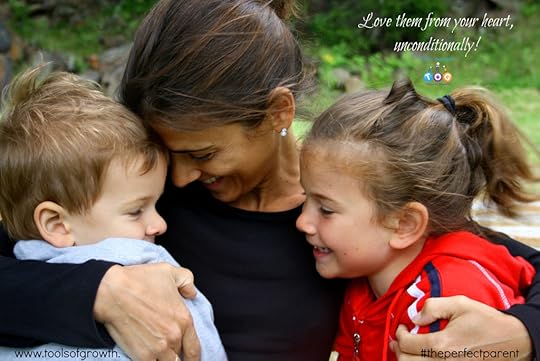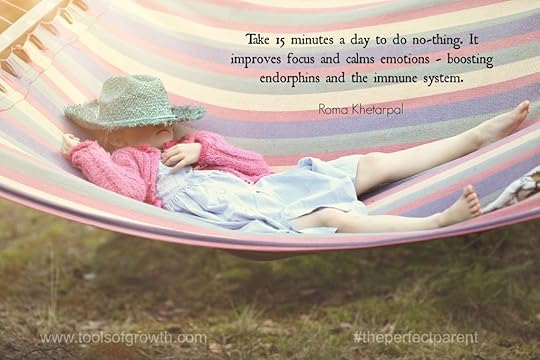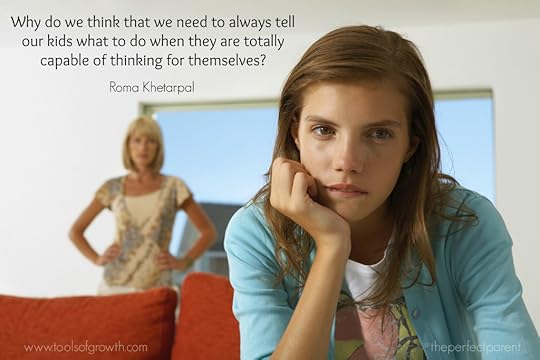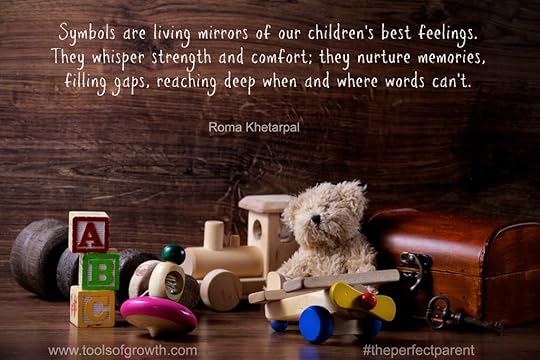Roma Khetarpal's Blog, page 24
August 11, 2015
Are Our Kids “WORTH IT?”

A friend of mine who was having some issues with her teenager told me recently, “I’m so tired of this parenting thing. Your kids are older. Tell me, is it even worth it?”
“Worth what?” I cleverly engaged.
“Worth the hassle! Don’t they eventually just end up moving on and leading their own lives and doing their own thing?” she asked.
“They do, for sure. Didn’t we?” I replied.
“Yeah, we did,” she admitted.
“Were we ‘worth the hassle?’” I challenged.
We both started laughing. “Yes we are!”
Almost instantaneously, we started reminiscing on what brats we were and how we challenged our parents in our teenage years and other pivotal times. The point is, I ask myself what it is that my parents did for me that makes me feel and say confidently, ” I AM worth it.”
On the flip side, my other dear friend had a very challenging upbringing. She now does whatever she can do to be the best parent she can be and gives her kids what she didn’t get growing up. She does exactly the same thing I do to make our kids feel self worth.
We all lie somewhere on this spectrum. And let’s face it, we know that our child’s self worth will show in their behavior much BEFORE they will ever ask us, “Mommy, am I worth it?”
Psychologists say that one’s self worth is often based on what we believe the most important people in our lives think of us. In the case of children, it is parents who contribute to their self worth. Interestingly enough, for adults, parents still primarily play a role and then it’s their spouse, children, friends, extended family, and community. Since parents have the most profound effect on a child’s life early on and in adulthood, it is our responsibility to make sure we add value to their lives.
To the best of our abilities, how can we add worth or value to their lives? Can we give them the confidence to believe in themselves, to value their own lives, to respect themselves, and to be open to growth? Yes, we can. By simply practicing these three simple TOGs:
LOVE them from your heart unconditionally, even when they make mistakes. Know the difference between who they are and what they did.
PATIENCE – it’s all about LISTENING. Listen with your heart and not just your ears. Read in between the lines and help them break down their thoughts and feelings when they are upset.
RESPECT them from your heart. Accept and honor their thoughts and feelings; good or bad, right or wrong. Keep in mind that they are thinking from their own perspective, which is based on their own understanding at the growth phase that they are in. In other words, a 13-year-old will behave like a teenager and not an adult.
AND SPEAK KINDLY – Kindness is a virtue of the heart. If you’re holding the love, patience, and respect in your heart while addressing an issue, speaking kindly will follow naturally. I promise you that! My mentor, Wayne Dyer, says, “Practice being kind, especially when you’re right.”
Most importantly, if you have had a hard day yourself, take a breath and chill first. If you’ve had an outburst, allow it. Know that we all make mistakes. If you think you’re worth it, you will be able to add value to your child’s self worth.
We don’t need research to assure us that parents who are loving, patient, respectful, and speak to their children kindly will Raise Kids to Be Happy, Think Positive, and Do Good!
The post Are Our Kids “WORTH IT?” appeared first on Tools of Growth.
August 3, 2015
Be a Sense-Able (Sensible) Parent!
We all want to have a great relationship with our kids and be able to communicate effectively with them. In The “Perfect” Parent, I share 5 tools to help you get there. One of those tools is Sense-able (Sensible) Parenting. This is a simple TOG (Tool of Growth) that can make a world of a difference when communicating with your children, especially if you’re having a hard time getting through to them:
The Sense-able Parent uses their five senses to communicate:
1. EARS AND LISTENING: Listen carefully to what your children say. Don’t just hear them, but actually listen and absorb their words. Allow them to complete their sentences. Let their words sink in for a moment before giving your opinion. One way to do this is to look deeply into their eyes when they are expressing their thoughts.
2. EYES AND WATCHING: Watch your children’s expressions carefully. It will help you to connect with them and understand their feelings. If you listen to them attentively, your eyes will automatically watch and not just see. With ears and eyes engaged, we have a clearer head and a more open-minded perspective.
3. NOSE AND SMELL: Our sense of smell is our gift of perception. Be perceptive, tune in, and “smell the situation.” Tuning in to their feelings about a situation will make your children feel supported and loved. Also, taking a deep breath through your nose helps to slow down your heart rate and keep you calm encouraging better conversations and decisions.
4. TONGUE AND TASTE: By listening, watching, and tuning in to their feelings, you will be mindful of the words you use to speak with your children. Words can be hurtful if not used mindfully. “Seasoning” your words with love and kindness (especially when there is a disagreement) will leave a good taste (feeling) both for you and your kids.
5. TOUCH AND LOVE: Michelangelo said, “To touch is to give life.” One of the best ways to communicate and connect with your kids, particularly if they are upset, is by gently touching a shoulder, holding a hand, stroking hair, or rubbing backs. Renowned psychologist, Dacher Keltner of UCB backs Michelangelo up with some great science behind the power of touch and communication and says that, “Touch is truly fundamental to human communication, bonding and health.”
Being a “sense-able” parent is a powerful and sensible approach, a wonderful access point to activate your PGS (Parental Guidance System) and communicate effectively with your kids. Start by using any one of your senses to communicate and watch the results it will bring. Try it and you’ll love it! Then come back and leave a comment letting us know how it went; we would love to get your feedback!
The post Be a Sense-Able (Sensible) Parent! appeared first on Tools of Growth.
July 27, 2015
Your Family Network is Your Family’s Net Worth
Two important mainstream words that are as applicable to family as to the world of business are:
Network: a connection, or an interconnected system of people or things
Net worth: value
The strength of connections, or the family network, and how well we communicate within this network is what determines our family’s net worth (value) and hence our family’s happiness index! A family’s net worth is the value that is drawn from communicating while growing together and learning together from our ups and downs. The value or worth drawn from these experiences over time solidifies a family’s happiness index.
Four simple TOGs (Tools of Growth) that you can apply now that will add worth or value to your family network:
1. Remember to use your PGS as often as possible. It will help you communicate better.
2. Be on the same page as your spouse (or other caretakers) with family values, guidelines, and responsibilities. Leadership starts at the top! If the adults caring for them communicate well with each other, children will learn by example.
3. Give children clear direction. Tell them “what to do” instead of “what not to do.” It saves time and confusion!
4. Stay reasonably and appropriately consistent. Remember what worked last year might not work this year. And sometimes, it is only a matter of tweaking your language to fit your child’s current mind set. In other words, be “creatively consistent.”
Remember, YOUR FAMILY NETWORK IS YOUR FAMILY’S NET WORTH!
Even Lee Iacocca, one of the world’s most famous and successful businessmen agress! He says:
“No matter what you’ve done for yourself or for humanity, if you can’t look back on having given love and attention to your family, what have you really accomplished?”
The post Your Family Network is Your Family’s Net Worth appeared first on Tools of Growth.
July 20, 2015
Repetitive Issues
Much of our confusion with children comes from moving our attention to the next thing too soon. Repetitive issues are the biggest indicator of that. Leftover, unaddressed, buried feelings will definitely knock the door of our attention–getting louder and louder each time we rush through them.
Take 5, 10, 15, 30 or whatever it takes to let the feelings come into full expression.
When we do this we do not transfer the remnants of unexpressed feelings on to the next experience.
The post Repetitive Issues appeared first on Tools of Growth.
July 13, 2015
What “Raising Children” Really Means
I don’t know how time has gone by. We were so busy for 20 years raising our children and now they’re off! But isn’t that the goal? Raise them right and watch them thrive? I know our kids don’t THRIVE because we tend to their needs. I know “raising” them does not mean tending to their needs alone; raising them does not mean just feeding them, and taking them to school, activities and play dates.
“Raising” them means lifting them up or elevating them to a higher level — a higher level of thinking, feeling, and behaving. Lifting them up means elevating the intellectual, emotional, and physical characteristics of their personality so that they can thrive independently. Here’s how:
1. Raise the intellectual characteristic of their personality by reasoning with your kids. Reasoning solidifies understanding. This will help them learn early on how to think before they act and also how to learn from their mistakes. Kids learn quickly. Take advantage of it!
2. Raise the emotional characteristic of their personality by making social and emotional learning (SEL) a family habit. Research indicates that a child’s social and emotional competence has a direct effect on their personal, academic and social success. Teach them how to identify and understand their feelings and lead by example. Kids find it easy to express their emotions and feelings. All they need is a little guidance.
3. Raise the physicalcharacteristic of their personality by teaching them how to express, in words, their thoughts and their feelings. Encourage and appreciate positive behavior. Discuss negative behavior. As mentioned above, explaining your reasoning will engage your children’s intellect and help them understand what they did wrong and how they can learn from it. Writing is another great form of physical expression. I often made writing what my children learned from an issue a part of the consequence for negative behavior. My son says it still helps him get back on track (and he’s 21!).
Practice is key, though! With a little practice, you can elevate your child’s intellect and emotions, and once they start to think independently and practice balancing their emotions, outward expression will follow.
Raising kids is paying attention to their inner and outer growth at every phase of their lives.
By just being aware of these TOGs (Tools of Growth), you can activate your PGS (Parental Guidance System) and Raise your kids to BE HAPPY, THINK POSITIVE and DO GOOD!
The post What “Raising Children” Really Means appeared first on Tools of Growth.
July 6, 2015
4 Ways to Be a GREAT Parent
“Why wouldn’t I? I would do anything for them… We have great parents.” This is what my sister said when I thanked her for offering to take our father to a doctor I was recommending whose office was almost an hour away from her house.
“Great Parents” I thought — “I do have great parents!” Almost instantly, I rewound my life in my head to when I was younger, and giggled; I did not think they were so great when I was 16… When my “not so great” parents did not let me go to my friend Paula’s party because they did not know ALL the attendees! And even that time when I was 10 and my parents did not let me stay up past 9 p.m. on weeknights… That was not “so great” of them either! They were also far from “great” when they denied me a sleepover at a new friend’s place whose parents they did not know, despite the fact that I was a big 7 year old girl who could take care of herself!
Clearly, greatness is a reflection. Even George Washington and Abraham Lincoln, whose greatness is celebrated today, weren’t regarded as “great” while they in the middle of being great.
So for YOU, parents, I say… Just like those great leaders and my parents, BE GREAT THAT WAY! Here are four simple win-win TOGs (Tools of Growth) that worked for my parents, and for me with my own children:
1. Be CONSISTENT about the decisions that you make for your children and your family. Consistency is not an act but a habit… a strong communication habit that will serve you well in the long run.
2. Stay WELL-INTENTIONED. As long as you are well intended and are keeping your own and your children’s best interests in mind, you ARE great… despite their tears and your guilt!
3. Be HUMBLE. Accept and apologize when you make a mistake. This might be the most important character-building and “greatness” example you will set for your kids. My wise grandfather used to say, “Humility is royalty without a crown — greatness in plain clothes.”
4. TRUST YOURSELF. Always know that trust is what fuels your PGS, Parental Guidance System. Trusting yourself will allow your greatness to shine, one decision at a time.
Sow the seeds of greatness now and I promise you, when your children are grown, they will KNOW that they have great parents which is even more important and speaks louder than saying, “I HAVE GREAT PARENTS!”
The post 4 Ways to Be a GREAT Parent appeared first on Tools of Growth.
June 29, 2015
Brake for No-thing Breaks
It’s summertime! I’m sure you’re grateful to get out of the scheduled routine that school and life put kids—and their parents—through! And yet this week I’ve heard five moms say the same thing: “I am exhausted, and summer has just begun.”
It’s true, we now have to fill the open hours ourselves—with day camps, dance and swim classes, speed-reading classes, and all kinds of other activities. All of a sudden you realize that you are overcommitted. Sure it’s self-inflicted punishment, but there is not much you can do about it.
We all know what happens when we overcommit. Tempers flare up, and emotions overheat, making a mess. The last thing you want to do during a break is recreate the emotional flare-ups that used to happen before and after school and that can literally break up your break.
It’s time to put your no-thing brakes on. What does that mean?
1. For you:
Forget all excuses, and take a 15-minute break every single day to do nothing…and I mean no-thing!
Here’s what is not allowed: reading, watching TV, working out (not even yoga), using mobile devices, or surfing the web.
What is allowed: listening to soothing music, closing your eyes, just sitting, meditating, and taking a nap.
The idea is to shut the mind off. And the only way we can do that is by resting the physical body and disengaging our senses. When we do that, we also jump off our emotional roller-coaster, bring it into balance, and then shift it to feel-good cruise control.
If, for whatever reason, your busy mind is not shutting off, here’s a tool to help you: Take a deep breath or two, and with every breath, slowly say the words “no-thing” calmly—out loud or in your mind. Focus on the letters in the word in your mind’s eye while breathing slowly. After a couple of tries, you will notice that the word replaces your rush of thoughts and ushers in moments of silence. With a little practice, the thought-ticker of your mind will start tapping into longer spaces of silence.
When I first started doing this a couple of years ago, I noticed the shift immediately. Within a few weeks, I actually could slip into the silent space at will.
The benefits of doing no-thing for 15 minutes? It improves circulation, brings mental clarity, releases endorphins, and turns down emotions. You stay calm, cool, and refreshed, helping you be a better parent and enjoy the ride.
2. For the kids:
Encourage your children to do the same. No digital toys for them either. Nothing that keeps the brain engaged. Tell the kids that this is a “quiet-time to do no-thing.” This type of mindful parenting is the second-best gift you can give your kids, next only to good nutrition. Teaching them by example how to shut out and shut off is the absolute best habit that you can help your kids develop—one that will contribute to academic success, future work-life success, and personal success and will help calm their emotions, too.
And for those who have active children, putting a timer on for 15 minutes will help get the kids through the time more easily. You could even take your break at the same time. If the kids are little and cannot be left alone, let them lie down right beside you. They might fidget for a bit, but doing no-thing consistently will help them get in the habit as well. If your children are older, having them be in their own rooms is the most ideal.
The benefits? A no-thing break helps the kids understand and be with themselves, and it’s a great remedy for “I’m bored.” It also improves focus and calms emotions—boosting endorphins and the immune system.
For all of us, it’s interesting how the benefits of doing no-thing for 15 minutes far surpasses the benefits of being busy all day long.
The post Brake for No-thing Breaks appeared first on Tools of Growth.
June 22, 2015
Why Do We?
Why do we push our own belief systems on our kids by setting expectations
that more often than not, hurt both, us and our kids? (Or everyone)
Why do we think that we need to always tell our kids what to do
when they are totally capable of thinking for themselves?
Why do we think that our kids will become leaders
when we are constantly nudging them to follow our lead?
The post Why Do We? appeared first on Tools of Growth.
June 20, 2015
Happy Father’s Day
Have you ever told your father how much he means to you…or let him know the father-moments you treasure?
More often than not, we share these feelings with everyone but our dad. So it’s no surprise that our own children follow suit.
With Father’s Day approaching, we decided to explore that. We asked a few fathers to share their fondest memory of a time spent with their father and then to describe him in just five words. After that, we asked their kids to do the same. Guess what? We found some common threads passed down through the generations. That’s something worth celebrating!
Here are the results:
David Watson
What is your fondest childhood memory with your father?
A trip the two of us took to Mt. Whitney when I was in junior high. As the youngest of four kids, I didn’t get a lot of opportunity for trips. The two of us got to spend special time together, hiking and camping for two nights and three days.
Five words to describe your father?
Goofy, smart, curious, friendly, a leader
David’s son Peter (age 10)
Favorite memory?
Spending time cuddling and building with Lego bricks.
Five words?
Awesome, funny, cuddly, helpful, fun
David’s son Harris (age 13)
Favorite memory?
Hanging out or running errands together. Spending time together, just the two of us.
Five words?
Enthusiastic, funny, an early bird, awesome, understanding
Clearly, the legacy that Grandpa Watson passed on to his son and grandsons is a penchant for one-on-one time spent together and a sense of humor. Priceless!
Here’s what the Gandhi family had to share:
Hetal Gandhi
Favorite memory?
Story time. My dad always spent time with us telling us the best stories!
Five words?
Funny, smart, hands on, Mr. Fix-it, and loving
Hetal’s daughter, Vaani (age 12)
Favorite memory?
When my mom went to Paris with my aunt, I loved spending one-on-one time with my dad. And when my dad comes back from his trips, he always, always, always comes to my room and gives me hugs and kisses—even if it’s late and I’m sleeping. It could be 3 a.m., and I know for sure, that he will still give me my special hugs and kisses quietly. And one more thing, my Dad loves to tell stories!
Five words?
Funny, nice, handsome, caring, and kind
Hetal’s son, Deven (age 10)
Favorite memory?
Nighttime story time.
Five words?
Playful, funny, smart, nice, cuddly
Thanks to grandpa Gandhi for passing on his storytelling talents and his funny bone!
Naturally, I couldn’t resist taking this to my own family!
Harry Khetarpal
Favorite memory?
Going to SC [USC] football games.
Five words?
Caring, loving, supportive, strong, dedicated to family
Son Navin (age 24)
Favorite memory?
Going to Laker games!
Five words?
Caring, happy, inspirational, funny, supportive
Daughter Nitasha (age 27)
Favorite memory?
Our intellectual talks about business, the Lakers…really anything and everything. He is always up for a great talk!
Five words?
Selfless, hug-obsessed, inspirational, always supportive, and genuine
Clearly, the Khetarpal family legacy is enjoying sports and being caring, supportive, and inspirational. I’m confident that my kids will pass along these valuable traits to their own children as well!
Says Dan Pearce, author of The Real Dad Rules, “Children are gifts. They are not ours for the breaking. They are ours for the making.” And truly it is the simple things in life—spending time, and being funny, supportive, caring, inspiring, and loving—that create memories and contribute to the “making” of our children. The simple things that cost nothing are the most valuable to our children.
What are your family legacies? Ask your spouse and your kids the two questions above, and find out! That makes a great Father’s Day gift for yourself, your spouse, your father…even another father whom you admire. And we’d love to know, too. Do share your thoughts with us on Facebook or Twitter.
Wishing all of you great Dads out there a very Happy Father’s Day!
Special thanks to the Watson, Gandhi, and Khetarpal families for sharing their reflections with TOG!
The post Happy Father’s Day appeared first on Tools of Growth.
June 15, 2015
Symbols
My son (now 24) still has his very first vinyl football–from when he was 3! It’s not something I had to save in a treasure box for him. It’s something that has moved with him, in and out of his living spaces–home, dorm rooms, apartment, back home.
To him, it’s a symbol. A toy that started out as a $3 item bought at a car wash has grown with him, becoming a symbol of many emotions and experiences–fun, strength, comfort, familiarity, competition and even leadership from his high school quarterback days. (I wouldn’t be surprised if he gifts it to his kids, in a glass box, signed and sealed–as a family heirloom.)
Symbols are living mirrors of our children’s best feelings. They whisper strength and comfort; they nurture memories, filling gaps, reaching deep when and where words can’t.
The post Symbols appeared first on Tools of Growth.













